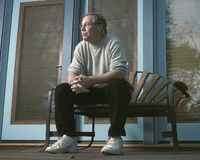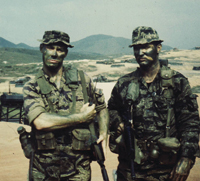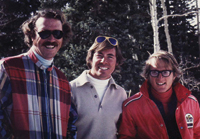
ALUM NOTE
A Yes That Changed My Life
For this returning Vet, a University of Utah administrator who saw me as more than a number has made all the difference.
by Larry Chambers
Chambers today, relaxing on his porch.
In 1969, I was one of several thousand GIs whose lives had been interrupted during the middle of college and were now returning home from Vietnam, trying to bridge the two-year gap back to normal life—and hopefully, get back to school. There was an unwritten rule that GIs just out of combat all understood: if you can make it for three months in the real world, you won’t re-up and go back.
At first you’re happy to leave, but then you feel guilty about the guys still there—which may be why most reenlistments occurred within the first 90 days of discharge.
In month three, after having been told I was too late to enter the fall semester at Chico State [California State University, Chico], I was about to cave in when a friend—a student at the University of Utah—invited me to come visit.
As I traversed the campus, I passed the administration building. I circled the quad twice before climbing the stairs to the Office of Admissions. Inside, I painstakingly filled out the application form and handed it to an assistant. As she read it over, she shook her head doubtfully. I told her that I had an AA degree, in case that wasn’t clear on the app.
“Maybe you should see Dean Gibbons.”
Chambers (at left) in 1969 with Gary Linderer, �one of my best friends. We were on the same six-man LRRP team (L Co 75th Rangers 101Abn) in 1969. We were hit by lightning on our last mission in the A Shau Valley three days later, but that is another story. He is also the reason I�m a writer. He got a book offer to write about his tour and asked me to write about my adventures at Special Forces Recondo School. He told me to send what I had to his editor at Random House. Six days later, Owen Lock from Ballantine called and said, �Hi, I want to buy your book.� �
She ushered me into his office and handed him my paperwork. He was scowling and mumbling while he studied my application and then my transcripts. It looked to me like he was mentally adding up my credits—and they weren’t adding up to admission. Without looking up, he said, “You know, of course, that classes have already begun. Why are you just now applying?”
I promised myself to call my recruiter as soon as I could get out of his office.
“Honestly, I never planned to come here. I just got back from ’Nam, and my hometown college said there was no room for me ’til next year.” I offered him a copy of my Army DD-214, my official record of military service.
He studied it line by line as he asked me what combat was like. His face didn’t reveal his thoughts, but his eyes softened as he listened to my account of the beauty of the place and the Vietnamese farmers. Suddenly, I was no longer being scrutinized by a dean, but just talking to a real person who was genuinely interested in me.
“I suppose most of the country was destroyed by the bombing?”
I explained that most of the fighting was taking place in the jungle and hills outside the cities and hamlets. My AO (area of operation) had been near Hue, Vietnam’s ancient capital. While the city was a mess after the beginning of the Tet Offensive (which coincided with the Vietnamese New Year), the old Imperial Palace wasn’t touched. In fact, one night just a couple of months before, I had flown low over it, sitting in the open doorway of the Huey helicopter, my feet hanging out over the city, not wanting the ride to end. I told the dean that it was the most exciting time of my life and how being in an infantry unit had changed the way I perceived everything. It taught me to think in new ways and to appreciate every moment.
Gibbons smiled fleetingly, then asked me to wait in the reception while he made a couple of phone calls. I could still hear every word he spoke.
Chambers (center) in 1972 with fellow ski instructors at the ski resort then called Park West, which is now The Canyons.
“I know we’ve already started and I know you have a full class, but he just got back from a war.” Suddenly, his voice bellowed like a water buffalo about to charge: “Then put another chair in the room!”
A few minutes later, Norm Gibbons walked out of his office, handed me my class schedule and shook my hand.
“Welcome to the University of Utah. You’ll need to work extra hard to catch up and you’ll have a full load, but basically you’re set.”
That day changed the direction of my life. Two years later, I rented a cap and gown and received my B.S. diploma. A year and a half after that, I got my master’s degree and began my career. In less than 20 minutes, Dean Gibbons gave me a break that freed me to get on with my life. And for that, I can never thank him and my alma mater, the University of Utah, enough.
— Joining the University of Utah in 1967, Normand �Norm� Gibbons was an administrator for nearly 30 years, serving as director of admissions, associate dean of student affairs, dean of students, and, for the last seven years before his retirement, vice president of student affairs and services.
Return to Spring 2008 table of contents
| Back to top
|




